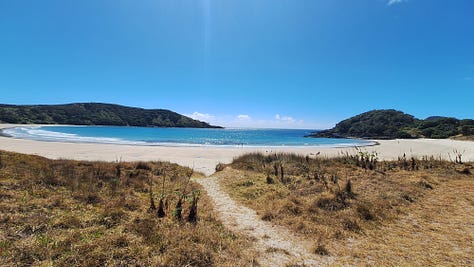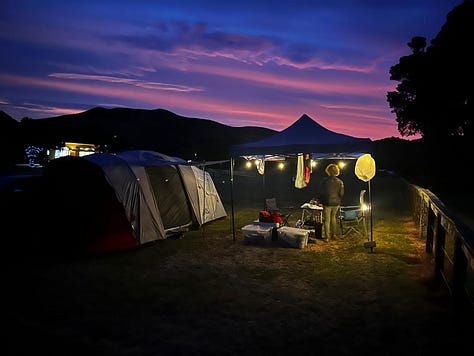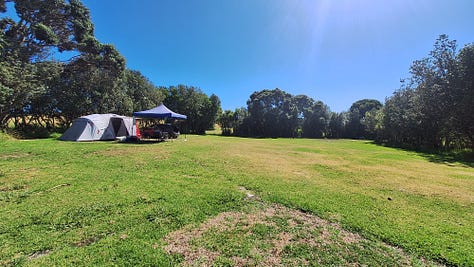Getting up close and personal with life
Notes from two weeks on the road
I’ve been a little quieter here over the last two weeks while I’ve been road-tripping around the far north of New Zealand with my husband and my tent. I took the bold step of leaving the laptop at home, since there would be nowhere to recharge, no Wifi connection, and nowhere secure to store it. It’s a great reminder of how life used to operate before devices hijacked our lives and our attention spans. It’s a little like severing a limb at first, until I remember - we were not born attached to screens, and our bodies and nervous systems function much better without them.
Whenever we tell my in-laws that we’re going camping, their response falls somewhere on a spectrum from surprise to mild horror, with comments like ‘why don’t you treat your wife to a nice hotel?’ As if stinginess could be the only rational explanation for our travel choices.
Sometimes I ask myself the same question. Why would we choose to rough it, with only a piece of nylon separating us from the elements? A home we have to painstakingly construct ourselves, only to dismantle again, piece by piece, a few days later. A home that may not necessarily survive high winds, a heavy downpour, or a cyclone, as past experience has shown me. With nowhere to refrigerate food and no en-suite. Why would we risk sleeping on an air mattress that may deflate in the night, getting bitten by mosquitos as we cook our dinner, and having to fight our way through four hundred zips every time we need to pee?
On paper, it doesn’t make a whole lot of sense.
But there’s a simplification that happens when you’re sleeping under the stars that’s hard to replicate elsewhere.
In New Zealand, the most beautiful and remote campgrounds are also often the most basic. Cold showers and long-drop composting toilets. No shops, no power. These are my favourites. These are where the noise of urban living is the most distant. Where my mind empties and my soul feels free. Where the night sky opens a window on the whole galaxy. We’re all in.
We sleep close to the earth, bumps, slopes and all, and wake to whatever weather system is passing through. It’s the closest and most connected I get to feel to nature and the elements. The sun, the wind, the rain, the smell of the earth, the dewy morning grass underfoot, the waxing moon, the birds, the bugs. When we sleep outdoors, we’re reminded that we are not separate, that we exist as part of the same eco-system.
There’s a grounding, and anchoring in putting pegs into the earth that invites a deeper connection to the patch of land you’re resting on. The invitation is to pause and remain a little longer, instead of responding to the mind’s endless quest for ‘what next?’ The invitation is to deepen our connection with the land, and sense ourselves in relationship to it.
Camping feels a little more akin to how our ancestors would have lived. Simple tasks that usually fade into the backdrop of daily life start to assume centre stage. The day revolves around multi-layered chores like making cups of tea, cooking, and washing dishes. It strips life down to its bare essentials – food and shelter - and brings the mind to a single point of focus, with little capacity for rumination, worry, and the endless fabrications we typically indulge in.
It’s not all paradise. There are bad moods, bad sleeps, body grumbles, biting insects, big winds. It’s life, up close and personal, without the distractions and conveniences.
But this is the thing. This absence of convenience pulls us right into the present moment. There’s simply nowhere else to be. The rest of the world slowly fades away - work, household chores, bills, politics, relationships. They’re a distant echo of a past life. Only the now exists. Only the challenge of boiling water, finding shade, and keeping the food cool.
On day one, I get dumped and dragged underwater by a large wave at the beach. A reflection that I’m not yet attuned with my environment.
By day three, I’m moving differently. I begin to remember that I’m inhabiting a body. The practical nature of the tasks - bending, stretching, walking to the water tap, swimming in the ocean, climbing in and out of tents - combined with the absence of screens and complex mental tasks, allows my awareness to settle back into my flesh and bones. The body starts to creak in places, but it also starts to hum with a sensation I vaguely remember - Aliveness. I’m awake. I’m embodied inside this vessel. The agitation and sluggishness of day-to-day living fades, and I recognise myself coming into a natural state of balance. By the end of the trip, my cheeks glow, and my eyes sparkle.
My body reminds me - This is how we’re designed to live.
By week two, the coastline shifts from sparkling golden bays, to vast stretches of powdery white sands and a piercing turquoise ocean, as we reach more remote northern spots, beyond the usual tourist trail. We start to feel like pros, setting up camp with ease and nestling into a simple routine - waking slowly, lingering over mugs of tea, gentle morning practices (I seek a shady spot for yoga, while my husband runs the length of the beach), morning swims, afternoon walks. And in between, reading, chatting, watching wildlife - cows, sheep, pūkekos and their fuzzy, gangly-legged chicks, wētā, ducks, oyster-catchers, a stingray close to the shore. I ponder why we live such overcomplicated lives? In recent years I’m more and more drawn in the direction of simplicity. More and more willing to trade adventure, achievement, and consumerism for peace, solitude, and wellbeing. To trade big international travels for getting intimate with the place we call home.
The truth speaks in the quiet hours when the distractions have fallen away. I wake at 2 am and step outside to find a stunning clear night sky awaiting me. As I bathe in the light of an almost full moon, I hear my intuition whispering of changes it longs for me to make. There’s no avoiding yourself in the stark, naked, silence. Whatever you have been trying to outrun - the tears, the fears, the longings - find their moment to make themselves known. In amongst the beaches, beauty, and awe, there’s an internal reckoning. A spotlight that shines on anything and everything that’s out of balance. Daring me to listen to myself. Daring me to follow my truth. Daring me to embrace my life more fully. To not drift through it in a trance of habitude.
Our trip began with the sliver of a new moon and ended with the full blood moon eclipse. I gaze out, on our last night, over rolling hills, farmland, and forest that frame the beautiful Tutukaka coastline – our last stop on the return journey home. The sun sets in dusky hues of peach, pink, and grey. I’m simultaneously filled up and emptied out. Salt-crusted and sun-baked. Tired, yet energised. Filled up on late summer goodness and ready for autumn’s onset. Re-connected to my wild self and ready for the comforts of home.
I’m not sure we would have got all of that in an Airbnb.






What is your relationship to sleeping outdoors? Love it or hate it, I’d love to hear from you. Or perhaps you have other ways you access that connection to self and the world? Do stop by in the comments and let me know your thoughts. I always appreciate your feedback and take the time to respond to everyone.
Thank you for reading.
If you value what you read here, you can support my work by liking and sharing this post, and by becoming a free or paid subscriber to The Therapy Room.












I love luxury as much as the next person but there is nothing like being out in nature camping. Not the camping where you're bumper to bumper with other campers getting asphyxiated by the many campfires hanging in the valley and people 'enjoying happy hour' but the kind where there's more solitude and isolation. It is deeply soul-satisfying.
I'm inspired! I used to camp all the time but not for some years now. My favorite part is hearing the night sounds while lying in "bed." I really like having some sort of screening to look up at the stars, too (as long as it's not going to rain).
What beautiful pictures!